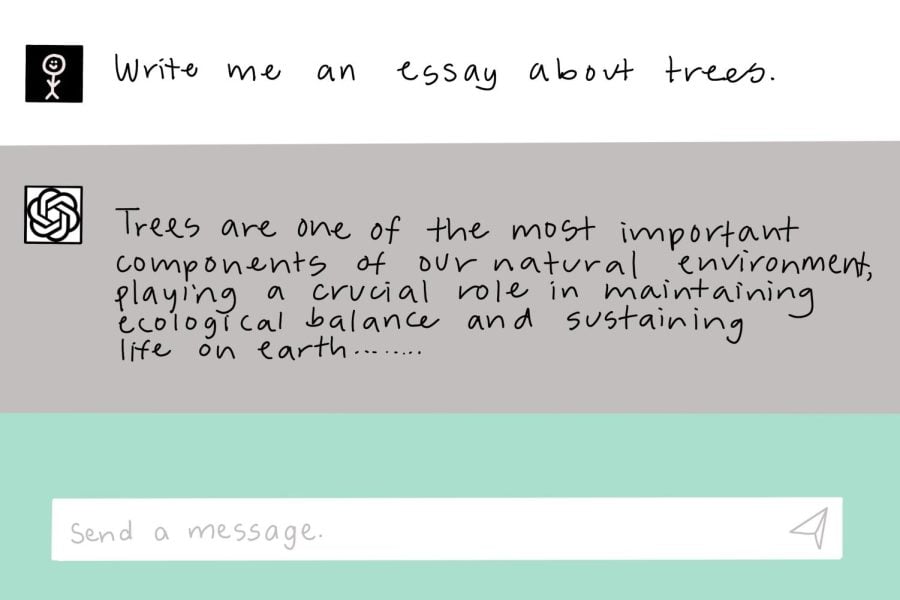Teachers at ETHS embrace ChatGPT
Teachers at ETHS want to help students use ChatGPT as a tool to aid their learning.
May 30, 2023
Teachers at Evanston Township High School see ChatGPT as an opportunity to rethink assessments and help students understand new technology, according to David Chan, director of instructional technology at ETHS.
Unlike some schools across the nation that banned the use of ChatGPT after it was released in November, ETHS officials decided to allow the unrestricted use of the AI tool in classrooms.
Chan helps guide teachers on how to properly incorporate technology into their teaching.
“We don’t have a firm stance or a policy on using ChatGPT just yet,” Chan said. “We do have it available and accessible for our students and staff to use if they want.”
Some teachers have found the policy encourages students to use the technology to completely write their assignments.
ETHS English teacher Al Dell Otto teaches junior and senior classes. Toward the end of the school year, they noticed more AI use in students’ writing assignments.
“I and other English teachers started to see more and more written work submitted by students that was pretty obviously generated by ChatGPT,” Dell Otto said. “I’ve had talks with my students just about like, ‘Hey, don’t do this. This is plagiarism.’”
Another key concern of ChatGPT is the impact the technology can have on a student’s critical thinking.
Niraj Javia, a math teacher at ETHS, said he addressed the use of AI tools in his math classrooms through conversation and exercises. He believes that technological tools like AI allow him to address deeper questions with his students –– but he doesn’t want them to mistake using the tool for understanding the subject.
“It’s a problem when you rely on this as a crutch to say, ‘Hey, I know what I’m doing,’” said Javia. “And then you get to the test and then all of a sudden you don’t know what you’re doing.”
Instead of discouraging students from using ChatGPT, ETHS teachers are trying to teach students to use it as a learning tool. But, Javia said, they’re careful to specify it shouldn’t be used as “get the answer quick scheme.”
For example, Dell Otto recently conducted a real world writing practice unit to teach students to generate cover letters, resumes and emails that they’d likely need to write as adults. In this unit, Dell Otto allowed students to use ChatGPT.
Dell Otto explained that the goal of these exercises is to “practice how (students) can use ChatGPT to (their) advantage and then go about editing and perfecting what it produces for (them).”
Similarly, Chan believes AI tools like ChatGPT give teachers an opportunity to reimagine their assessments. He hosted an open session with teachers looking to discuss the issue.
To him, it’s not just about making assignments that can’t be answered using ChatGPT, but rather adding a more personal aspect to each one.
In the open session, he challenged teachers to ask how they can make their assignments “more personal and really getting at what I want my students to learn and less about the things that can just be answered so quickly.”
Both Dell Otto and Javia believe that since AI technology is not going anywhere, it’s their duty to equip students with the skills to best leverage it.
Dell Otto hopes that ChatGPT encourages teachers to adapt their instruction to give students skills that will be relevant when they graduate.
“If we can help equip (students) with the skills to use ChatGPT as a tool that helps them in their real life, then that’s also a good push, right?” Dell Otto said. “I’m trying to stay optimistic and think about how this can push us to be better as educators.”
Email: zoeysoh2023@u.northwestern.edu
Twitter: @zzoeysoh
Related Stories:
— Northwestern community members discuss use of AI program ChatGPT to write academic papers
— ChatGPT: TikTok trend turned classroom friend
— Mills: Will you win the imitation game, or will AI prevail?



